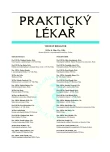-
Medical journals
- Career
Patient satisfaction with provided care: theoretic approaches and models
Authors: J. Mareš
Authors‘ workplace: Lékařská fakulta UK v Hradci Králové ; Přednosta: doc. MUDr. Svatopluk Býma, CSc. ; Ústav sociálního lékařství
Published in: Prakt. Lék. 2009; 89(2): 59-64
Category: Reviews
Overview
This overview study reveals the current knowledge on patient’s satisfaction with healthcare, with the emphasis placed on general practice medicine. The study is subdivided into four parts. Firstly, different approaches to define a concept of patient satisfaction are given. In the literature, the concept of satisfaction has different dimensions (some authors only consider positive aspects, while others consider all aspects including the negative ones). Approaches differ in understanding the content of satisfaction (one-dimensional perception of patient’s attitude or multidimensional perception). Satisfaction is defined in a different time frame (current and long-term satisfaction) for different parties (individual, group of patients, all patients in GP’s care).
The second part of the study reveals two models of satisfaction, which show relationships between variables (the first emphasizes the physician-patient interaction, the second emphasizes the episodes of care provided).
The third part of the study comprises information on variables that influence patient satisfaction. Six factors are given: physician, nurse, patient, provided care, environment, health system and its regulations.
The fourth part deals with functions, which can be used for identifying patient satisfaction. Patient satisfaction is important, but not the only parameter of quality of care.Key words:
patient, physician, general practitioner, patient satisfaction, definition, models, determinants, medical care.
Sources
1. Andén, A., Anderson, S.O., Rudebeck, C.E. Concepts underlying outcome measures studies of consultations in general practice. Scand. J. Prim. Care. 2006, 24, p. 218-223.
2. Baker, R. Pragmatic model of patient satisfaction in general practice: progress toward a theory. Qual. Health Care 1997, 6, p. 201-204.
3. Beckman, H., Kaplan, S.H., Frankel, R. Outcome-based research on doctor-patient communications: a review. In Stewat, M., Roter, D. (Eds.) Communicating with medical patients. Newbury Park: Sage Publication, 1989. ISBN 978-0-803932173.
4. Coulter, A. Evaluating the outcomes of health care. In Gabe, J., Calnan, M., Bury, M. (Eds.) The Sociology of the Health Services. London: Routledge 1991, p. 115-139. ISBN 0 - 203404750.
5. Das, J., Sohnesen, T.P. Variation in doctor effort: evidence from Paraguay. Health Affairs 2007, 26(3), p. 324-337.
6. Deveugele, M., Derese, A., Bacquer, D.D., et al. Consultation in general practice: a standard operating procedure? Patient Educ. Couns. 2004, 54, 2, p. 227-233. 7.
7. Fitzpatrick, R. Satisfaction with health care. In Fitzpatrick, R., Hinton, J., Newman, S. (Eds.) The experience of illness. London: Tavistock, 1984, p. 154-175.
8. Haas, M.R. The benefits of health care beyond health: an exploration of non-health outcomes of health care. Doctoral Dissertation. Sydney: University of Sydney, Faculty of Medicine, 2002, 284 p.
9. Hartl, P., Hartlová, H. Psychologický slovník. Praha: Portál, 2000, 774 s. ISBN 80-7178-303-X.
10. Hornbrook, M.C., Hurtado, A.V., Johnson, R.E. Health care episodes: definition, measurement and use. Med. Care. Rev. 1985, 42(2), p. 163-218.
11. Howie, J.G., Heaney, D.J., Maxwell, M. et al. A comparison of a patient enablement instrument (PEI) against two established satisfaction scales as an outcome measure of primary care consultation. Fam. Pract. 1998, 15(2), p. 165-171.
12. Légaré, F., Moher, D., Elwyn, G. et al. Instruments to assess the perception of physician in decision-making process of specific clinical encounters: a systematic review. BMC Med. Inform. Decis. Mak., 2007, 7, p. 30.
13. Linder-Pelz, S. Toward a theory of patient satisfaction. Soc. Sci. Med. 1982, 16, p. 577-582.
14. Mareš, J. Určování stavu, kdy se člověk cítí „už dobře”. In Mareš, J. a kol. Kvalita života u dětí a dospívajících I. Brno: MSD 2006, p. 95-196.ISBN 80-86633-65-9.
15. Mead, N., Bower, P., Roland, M. The general practice assessment questionnaire (GPAQ) – development and psychometric characteristics. BMC Fam. Pract. 2008, 9(13), 11 p. [on line]. Dostupné na http://www.biomedcentral.com/1471-2296/9/13.
16. Medical Terminological Dictionary, 2008. Dostupné na: http://www. Medical Dictionary Online http://www.online-medical-dictionary.org/
17. Roter, D.L. The Roter Method of Interaction Process Analysis. RIAS Manual. Baltimore: John Hopkins University, 2000.
18. Seifert, B., Beneš, V. a kol. Všeobecné praktické lékařství. Praha: Galén a Karolinum, 2005, 292 s. ISBN 80-7262-369-9; ISBN 80-246-1131-7.
19. Sitzia, J., Wood, N. Patient satisfaction: a review of issues and concepts. Soc. Sci. Med. 1997, 45(12), p. 1829-1843.
20. Stott, N., Kinnnersley, P., Elwyn, G.J. Measuring general practice-based primary care: generic outcomes. Fam. Pract. 1997, 14(6), p. 486-491.
21. Ware, J.E., Snyder, M.K., Wright, W.R. et al. Defining and measuring patient satisfaction with medical care. Eval. Program Plann. 1984, 6, p. 247-263.
22. Wensing, M., Baker, R., Szecsenyi, J. et al. Impact of national health care systems on patient evaluations of general practice in Europe. Health Policy 2004, 68(3), p. 353-357.
23. Wickizer, T.M., Franklin, G., Fulton-Kehore, D. et al. Patient satisfaction, treatment experience, and disability outcomes in a population-based cohort of injury workers in Washington state: Implication for quality improvement. Health Serv. Res. 2004, 39(4), p. 727-748.
Labels
General practitioner for children and adolescents General practitioner for adults
Article was published inGeneral Practitioner

2009 Issue 2-
All articles in this issue
- Post-traumatic stress disorder in abused children
- Smoking and cardiovascular diseases
- The role of reduction mammaplasty in breast hypertrophy
- Prevention of tick-borne encephalitis from the point of view of a health insurance company
- Hand transplantation
- Neurostimulation for the treatment of refractory angina pectoris
- Pathophysiology of diabetic retinopathy
- Allergic rhinitis as an occupational disease
- Patient satisfaction with provided care: theoretic approaches and models
- General Practitioner
- Journal archive
- Current issue
- Online only
- About the journal
Most read in this issue- Hand transplantation
- Post-traumatic stress disorder in abused children
- Allergic rhinitis as an occupational disease
- Patient satisfaction with provided care: theoretic approaches and models
Login#ADS_BOTTOM_SCRIPTS#Forgotten passwordEnter the email address that you registered with. We will send you instructions on how to set a new password.
- Career

